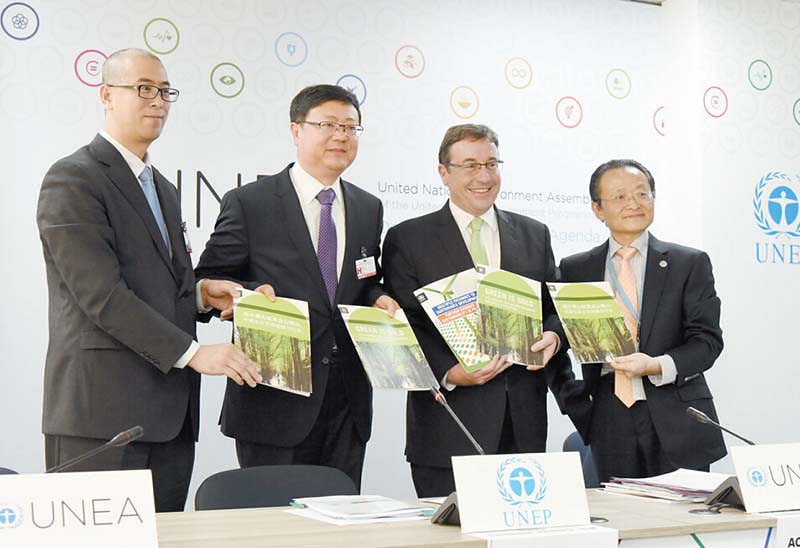Chinese wisdom on ecological civilization goes global

UNEP Executive Director Achim Steiner (R2) and Chen Jining (L2), Chinese minister of environmental protection, releasing reports introducing China’s experience in building an eco-civilization at a press conference on May 26, 2016.
Almost a quarter of China will be covered with forests by 2020 if the country succeeds in its mission to build an “eco-civilization,” according to a report by the United Nations Environment Programme (UNEP).
The report Green is Gold, released on May 26 at UNEP’s headquarters in Nairobi, Kenya, looks at the environmental dimensions of China’s 13th Five-Year Plan (2016-2020).
China was one of the first countries to integrate sustainable development into its national strategy, and many milestones have been reached in its efforts to realize the Millennium Development Goals in the past 15 years. China has contributed a lot to global sustainable development, said Chen Jining, head of the Chinese delegation to the UN Environmental Assembly and Chinese minister of environmental protection.
“If China succeeds in achieving the targets set in its 13th Five-Year Plan, then it will have taken a major step towards shifting to a greener economy,” UNEP Executive Director Achim Steiner said. The ecological civilization approach offers concrete ways to put concepts of sustainable development into practice, and China has set an example for other countries facing similar economic, environmental and social challenges, he added.
Zhang Haibin, a professor of international relations at Peking University, said the world needs China’s experience, and that is why the assembly released a report on China’s strategy and practice with regard to ecological civilization. Chinese environmental protection ideas and policies, especially its new energy policies, have earned it the praise of the international community.
Yu Hai, director of the Policy Research Center for Environment and Economy at the Ministry of Environmental Protection and also one of the authors of the report, said that the idea of ecological civilization integrates all kinds of ancient Chinese wisdom. A report on recent Chinese practices and achievements summarized, refined and delivered by UNEP demonstrates the world’s recognition of China’s ideas on ecological civilization, Yu said. Sheng Fulai, head of the economic research unit at the UNEP, agreed, saying that China’s ideas and practices are valuable to the world.
An exhibition of Chinese electric bicycles attracted a lot of attention from delegates. Bert Fabian, program officer of the Division of Technology, Industry and Economics (DTIE) at UNEP, said electric bicycles are widely used in China, and other countries can learn from this approach to transportation. Green industries in China like energy conservation are growing ever bigger with technological innovation. This wide market will drive future economic development and social progress.
Growing consciousness of environmental protection is now commonly seen among citizens in China, which is vital for the development of green economy. The government has attempted to balance the development of the environment, the economy and society in order to achieve sustainability. The concept of eco-civilization originates from ancient Chinese wisdom, which values the harmonious coexistence of people and nature. This type of mentality is exactly what green development aims to achieve, said a project officer at UNEP’s International Environmental Technology Centre.
